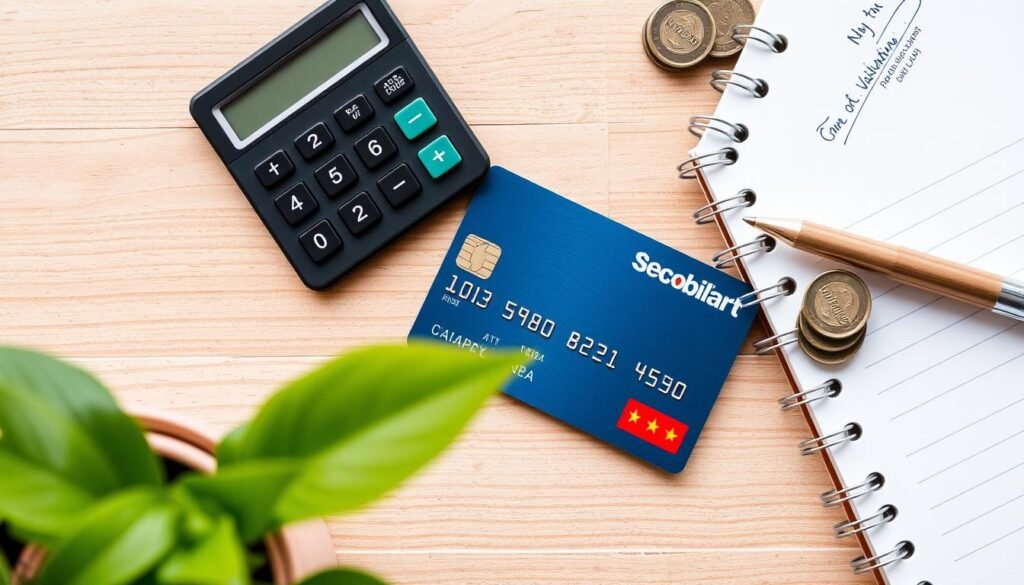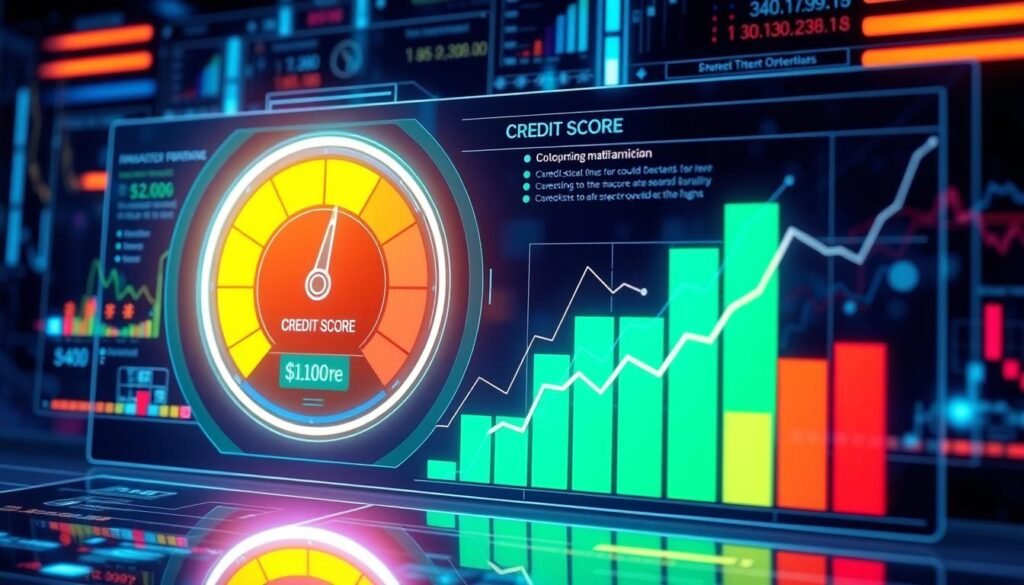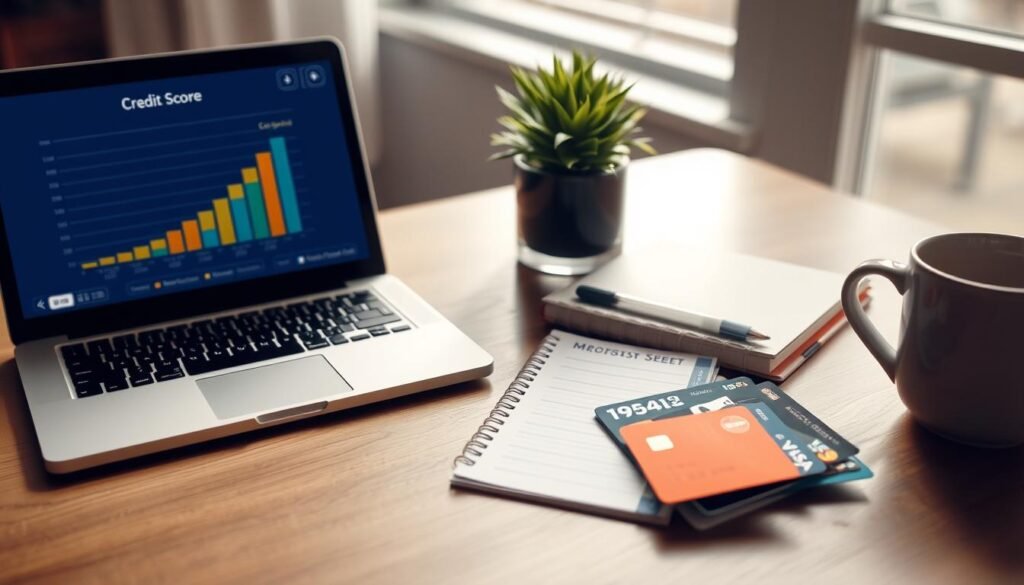This post may contain affiliate links, which means I may earn a commission if you purchase through these links at no extra cost to you
Taking control of my credit once felt like an uphill battle. I’ve been turned down for loans and credit cards before because of bad credit, and I know I’m not alone—many of us are working hard to rebuild our credit scores. One of the best tools I discovered along the way was a secured credit card. It helped me take a real step toward financial stability.
When I first heard about secured credit cards, I’ll admit—I was unsure. But once I understood how they work, it made perfect sense. I started by putting down a deposit that matched my credit limit—$500 in, $500 limit. That security deposit gave the lender confidence, and in return, I got a chance to prove I could use credit responsibly.
At first, it was a bit intimidating, but once I got the hang of it—making on-time payments and staying within my limit—I started to see real progress. In as little as six months, my credit score began to rise. One card that really stood out to me was the Discover it® Secured Credit Card—not only did it help me build credit, but they even offered a path to graduate to an unsecured card.
If you’re on the same journey I was, don’t be discouraged. Secured credit cards can be a powerful way to take charge of your financial future.
Table of Contents
ToggleWhat Is a Secured Credit Card?
Secured credit cards are great for boosting or fixing your credit. They work differently than regular credit cards because you need to put down a deposit. This deposit acts like a safety net for banks and also sets your credit limit.
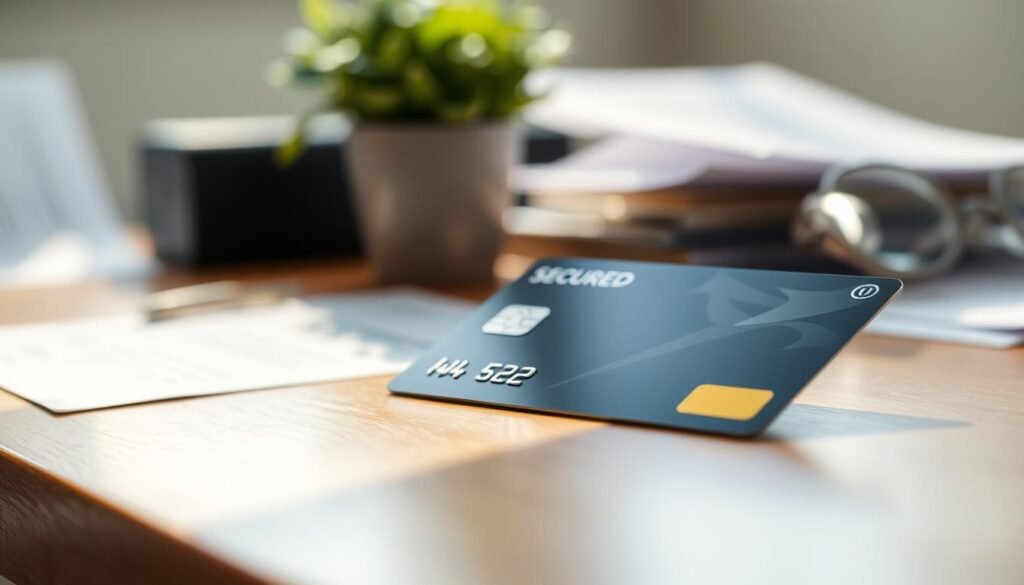
Definition and Key Features
A secured credit card requires a deposit that you can get back. This deposit can range from a couple hundred to a few thousand dollars. It decides how much you can spend on the card. Secured credit cards help your credit grow by reporting how you use the card to major credit bureaus.
Making payments on time is crucial because it affects most of your FICO score. Also, try to use less than 30% of your credit limit. This will keep your credit utilization low, which is good for your credit score.
How It Differs from Unsecured Credit Cards
Unsecured credit cards don’t need a deposit and usually offer more credit. They also tend to have lower interest rates. But, if your credit isn’t great, these cards might be hard to get.
Secured credit cards are easier to qualify for if you have poor credit. Using one wisely can help you get your deposit back. Eventually, you might even qualify for a regular credit card. This can lead to a better credit score.
Secured credit cards aim to help those with low or no credit show they can handle money wisely. Keeping an eye on your credit score and always paying on time goes a long way toward building your credit.
Benefits of Using a Secured Credit Card
Many people want to improve their credit scores. Secured credit cards are a good choice for this. They help those just starting or those trying to rebuild their credit.
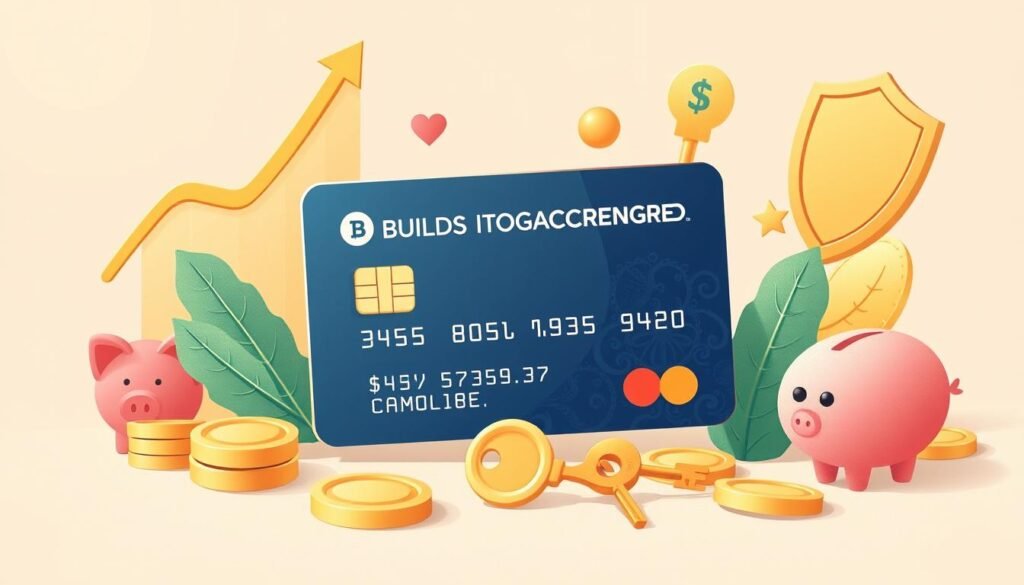
Building Credit History
Using a secured credit card helps in building credit history. Paying on time each month improves credit scores in six months. Issuers report to Equifax, TransUnion, and Experian, which helps a lot.
Opportunity to Upgrade to Unsecured Credit Cards
Secured credit cards are a first step toward getting unsecured cards. With time and good habits, you can move up. For example, Discover might switch you to an unsecured card and return your deposit, sometimes with interest. With the upgrade comes higher limits and rewards.
Lower Risk for Lenders
These cards are less risky for lenders because of the deposit you make. If you can’t pay, the deposit covers it. So, these cards are easier to get if your credit score is low. They’re a great way to start building credit.
Secured credit cards offer many benefits for improving your credit. They’re helpful whether you’re starting fresh or fixing your credit. Just use less than 30% of your limit and always pay on time.
Choosing the Right Secured Credit Card
When picking a secured credit card, think about some key factors. They will help you build your credit well.
Important Factors to Consider
Choosing the best secured credit card means looking at different things. Look at monthly and yearly fees, how much you need to deposit, and any extra benefits:
- Annual Fees: Secured credit cards had an average annual fee of $94 in 2020. However, some can cost more.
- APRs: Some cards have APRs above 30%. It’s important to pay off the balance each month to avoid high interest.
- Other Fees: Watch out for application fees, processing fees, and charges for foreign transactions. They can add up.
- Deposit Requirements: Usually, you need to make a cash deposit upfront. For example, a $200 deposit gives you a $200 credit limit.
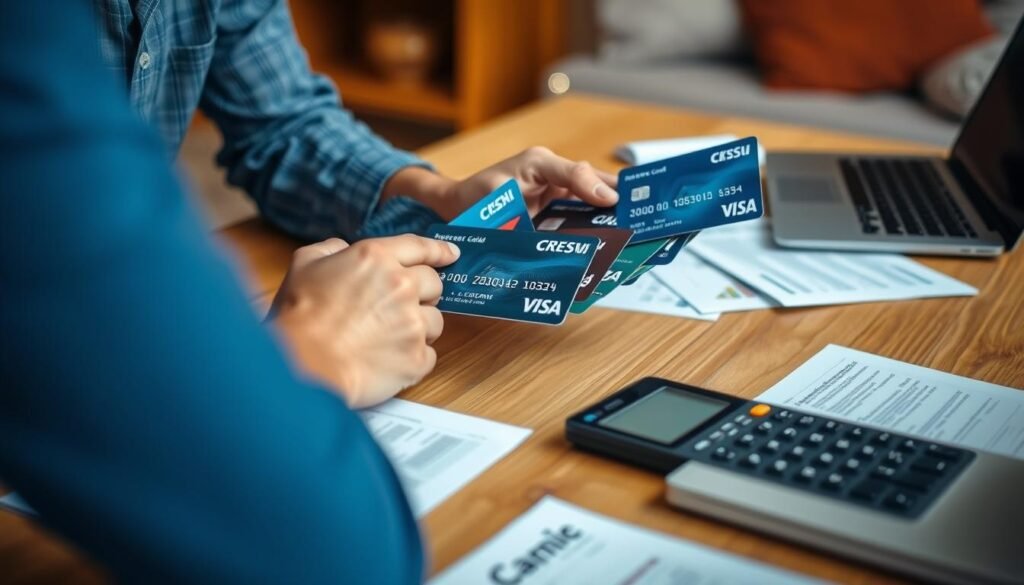
Also, see if the card offers rewards or benefits. Things like cash back or points on purchases can make the card more valuable.
Comparing Interest Rates and Fees
It’s crucial to do detailed research when comparing rates and fees:
Look at these key features:
| Feature | Details to Consider |
|---|---|
| Interest Rate (APR) | Make sure the APR is something you can handle. Remember, some cards charge over 30% a year. |
| Annual Fees | The average fee is about $94. Yet, looking for lower or no fees is better. |
| Security Deposit | Find a deposit amount that fits your budget. |
| Other Fees | Keep an eye out for extra fees like application, processing, and for using it abroad. |
In the end, ensure the card you choose offers credit monitoring. This helps you keep an eye on your credit. Following these tips will lead you to a secured credit card that matches your financial needs and goals.
How to Use a Secured Credit Card to Build Credit
A secured credit card is great for people starting or mending their credit history. It needs a security deposit that usually sets your credit limit. This deposit helps if you have low or weak credit.
For best results, buy things regularly but keep your spending low. Aim to use less than 30% of your credit. For example, on a $500 limit, try not to go over $150.
Paying on time is also crucial. It prevents costly interest and shows you’re responsible. Setting up auto-pay can help you never miss a payment date. Paying on time plays a big part in getting a better credit score.
It’s vital to monitor your credit score. Watching your progress allows you to make needed changes. Tools like CreditWise give you easy access to your credit report and scores. This keeps you informed about your credit health.
Certain cards, like the Discover it® Secured Credit Card, tell all the major credit bureaus about your activity. This is important for building or fixing your score. The Discover it® Secured Card even offers cash back as you work on your credit.
| Card Issuer | Security Deposit | Credit Limit | Rewards |
|---|---|---|---|
| Discover it® Secured | $200+ | Equal to deposit | Up to 2% cash back |
| Capital One Secured | $49 – $200 | $200 minimum | No rewards |
| Quicksilver Secured | Varies | Based on deposit | 1.5% cash back |
Strategies for Responsible Credit Usage
Learning to use credit wisely is key to good financial health. By following certain steps, you can boost your credit and improve your score.
Making Timely Payments
Making payments on time is very important. The CARD Act of 2009 shows how vital this is, especially for people under 21. Doing this well can improve your credit score significantly, as it counts for 30-35% of it.
Paying on time is essential. Being timely shows you’re reliable and helps avoid fees. These can affect your report for seven years.
Keeping Your Balance Low
It’s also smart to keep your balances low. Try to use less than 30% of your credit limit. For example, if you have a $300 limit, spend less than $90.
Using tools like the Self Visa® Credit Card can be really helpful. They guide you to use your credit wisely, which is great for your score.
Avoiding Maxing Out Your Credit Line
Don’t max out your credit cards. Keeping your utilization low is good for your report. Store cards often have high rates but are easier to get, so use them wisely.
You should make small purchases and pay them off quickly. This helps you keep your utilization low and boost your credit.
To use credit responsibly, combine several smart strategies. By being careful, you can create a strong credit history. This opens doors to more financial chances in the future.
Monitoring Your Credit Score
Understanding your credit score is vital when you’re using a secured credit card. By monitoring your credit regularly, you can see your progress. You can also fix mistakes quickly, which helps your score grow. On average, using a secured credit card correctly can boost your score by 30-50 points.
Keeping your credit use under 30% is important. This is the best way to help your credit score rise.
Many banks offer tools to watch your credit for free or a small fee. It’s a good idea to check your credit reports from Equifax, Experian, and TransUnion often. This gives you a full view of your credit health. Spotting errors or fraud early can save you a lot of trouble.
Making payments on time is crucial. It affects 40% of your credit score. Paying on time helps improve and keep your credit score high.
Credit monitoring teaches you about your credit status. It helps you make smart moves in the future. Some secured cards can become regular cards after 6-12 months of good use. Staying below the 30% credit use is essential for this upgrade.

